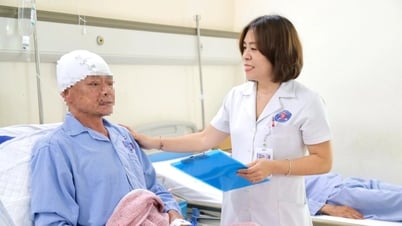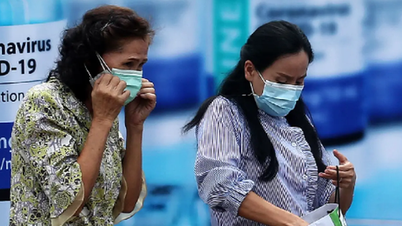That was the statement of Specialist Doctor II Phan Tan Thuan, Head of the Clinical Trial Unit (CRU) of Ho Chi Minh City Oncology Hospital at the Seminar "Promoting innovation in Vietnam through clinical trials" organized on May 20 by the Pharmaceutical Subcommittee (Pharma Group), a branch of KPMG Tax and Consulting Limited Liability Company in collaboration with the Oxford University Clinical Research Unit (OUCRU).
Transforming health systems through clinical research
Dr. Phan Tan Thuan shared: “Cancer is a leading burden in Vietnam as well as globally. Over the past 20 years, the field of cancer diagnosis and treatment has developed rapidly with new generation immunotherapy and therapies. At the hospital, the number of clinical studies has increased from a few cases to more than 30 simultaneous trials, expanding access to advanced treatment methods for patients. However, we still face many challenges in terms of facilities and professional human resources. We are working hard to standardize processes, improve capacity and build a research network to meet increasing demands.”
Over the past two decades, Vietnam has made significant progress in expanding access to health care and strengthening its public health system. The country now provides health insurance coverage to 95% of its population, laying a solid foundation for the next phase of development. This achievement reflects sustained investments in primary health care, public health service delivery and infrastructure.
The next challenge is the transition from expanding access to care to providing higher quality care that fosters innovation. Clinical trials therefore serve not only as a tool to validate new solutions but also as a foundation for building long-term capacity in research,education and health system development. As more countries compete for a share of global research investment, Vietnam has a clear opportunity to position itself as a regional leader in clinical trials.
With a population of over 100 million, Vietnam has great potential for clinical research. Vietnam’s diverse population structure is well suited to research on complex diseases such as cancer, cardiovascular disorders, infectious diseases and metabolic conditions. These inherent advantages are further reinforced by government initiatives to improve the business environment, helping to attract pharmaceutical companies and contract clinical trial organizations (CROs) from around the world.
“From the perspective of the innovative pharmaceutical industry, Vietnam has great potential to become a competitive clinical research destination in the region. To realize this vision, priority policies and initiatives are needed to attract and facilitate investment in clinical trials – especially early-stage trials,” said Mr. Darrell Oh, Chairman of Pharma Group.
Dedicated efforts and multi-stakeholder collaboration will unlock a range of economic, scientific and health benefits, including: promoting high-value research activities through infrastructure development and skilled job creation, strengthening Vietnam’s healthcare innovation ecosystem, and creating economic spillovers across sectors and delivering systemic benefits to public health. This is fully consistent with Vietnam’s national strategies and goals to become one of the top three ASEAN destinations for high-value investment.”
Exploiting the potential of clinical trials in Vietnam
Alongside the opportunities, Vietnam faces significant barriers such as ineffective regulation, slow and fragmented approval processes, which slow down the implementation of clinical trials. In addition, the industry still faces infrastructure constraints, including a lack of Good Clinical Practice (GCP) certified facilities, and capacity constraints.
In addition, the lack of well-trained staff and preferential policies and funding sources reduce Vietnam's competitiveness compared to countries such as Malaysia and Singapore.
Therefore, to become a leading clinical trial destination in the region, Vietnam needs to implement policy and non-policy measures, with short-term, medium-term and long-term time frames.
In the immediate future, priority should be given to regulatory reform and simplifying approval mechanisms to facilitate the flow of trials, while increasing investment incentives to attract resources. At the same time, it is necessary to focus on improving infrastructure, developing high-quality human resources, and enhancing research and development (R&D) capacity.
In particular, dedicated support for clinical trials and strong public-private partnerships are needed. Stakeholders play a key role in implementing these solutions. Looking to the world, successful examples from other countries will be a valuable reference, guiding Vietnam to realize the great potential of the clinical trial sector.
In particular, to strengthen in-depth research, Vietnam also needs to expand the network of facilities certified for good clinical practice (GCP); develop clinical trial units (CTUs); establish a national center of excellence (CoE) to act as a platform connecting hospitals, research institutes, universities and enterprises, as a training center for clinical researchers, speed up the trial approval process and promote global cooperation - thereby positioning Vietnam as a competitive destination in the field of clinical research.
According to KPMG estimates, if these reforms are effectively implemented, Vietnam could achieve 86 trials with a compound annual growth rate (CAGR) of 24.3% with a market value of US$749.5 million, with a CAGR of 88.6% by 2029. This would create thousands of high-quality jobs, enhance Vietnam’s global position in medical research, and provide early access to advanced treatments.
Mr. Luke Treloar, Partner, Head of Infrastructure, Government and Health (IGH), KPMG in Vietnam strongly believes that, with the right policy framework and cross-sector collaboration, Vietnam has the potential to become a leading hub for clinical trials in Southeast Asia, driving sustainable growth and medical innovation in the region.
Source: https://nhandan.vn/giai-phap-phat-trien-thu-nghiem-lam-sang-post881075.html



![[Photo] Anh Hoang - Dinh Duc successfully defended the men's doubles championship of the National Table Tennis Championship of Nhan Dan Newspaper](https://vphoto.vietnam.vn/thumb/1200x675/vietnam/resource/IMAGE/2025/5/23/d6ab3bcac02c49928b38c729d795cac6)
![[Photo] Top players gather at the 2025 Nhan Dan Newspaper National Table Tennis Championship](https://vphoto.vietnam.vn/thumb/1200x675/vietnam/resource/IMAGE/2025/5/23/9ad5f6f4faf146b08335e5c446edb107)

















![[Photo] Anh Hoang - Dinh Duc successfully defended the men's doubles championship of the National Table Tennis Championship of Nhan Dan Newspaper](https://vphoto.vietnam.vn/thumb/402x226/vietnam/resource/IMAGE/2025/5/23/d6ab3bcac02c49928b38c729d795cac6)
![[Video] Launch of the publication "The Teacher and the Books"](https://vphoto.vietnam.vn/thumb/402x226/vietnam/resource/IMAGE/2025/5/23/f8b7526776a44a57b0d4d9213c0c660d)




































































Comment (0)